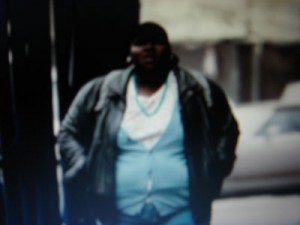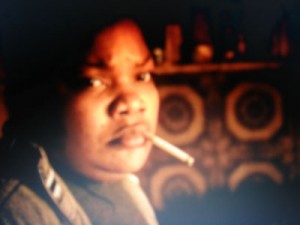 Precious: Based on the Novel Push by Sapphire, 2009. Directed by Lee Daniels, written by Geoffrey Fletcher. Starring Gabourey ‘Gabby’ Sidibe, Mo’Nique, Paula Patton, and Lenny Kravitz and Mariah Carey, for Christ’s sake.
Precious: Based on the Novel Push by Sapphire, 2009. Directed by Lee Daniels, written by Geoffrey Fletcher. Starring Gabourey ‘Gabby’ Sidibe, Mo’Nique, Paula Patton, and Lenny Kravitz and Mariah Carey, for Christ’s sake.
Precious is the story of a young woman, all of sixteen, who has been raped twice by her father and given birth to a pair of children from him. The eponymous girl, played with steely determination by Gabourey Sidibe, is beaten by her mother. She is overweight. Because of her pregnancy, she must drop out of school and attend an alternative high school in one of the upper floors of a run down New York hotel, which is often surrounded by crack heads. Poor Precious hates how she looks, wishes she were white, wishes she had a light-skinned boyfriend, wishes she was on a Black Entertainment Television music video. She is good at math, but she cannot read. At last, she is HIV-positive.
Precious’ life is difficult, to say the least. But in Precious, Based on the Novel Push by Sapphire, director Lee Daniels and writer Geoffrey Fletcher have created a Disney heroine, wandering through an empty fairy tale that is as damaging to young black women as the movies and TV shows that make Precious wish she were white. Precious, with its suggestions that young, troubled women wait for fairy godmothers and -fathers is a travesty and a burden.
The sordid facts: Precious lives at home with her Gorgon mother Mary (Mo’Nique, in a great performance.) Mary’s boyfriend, also Precious’ father, is not usually around. When he does drop by their run-down tenement now and again, he spends his time raping the young girl while bacon and eggs pop and spray in a pan (perhaps the most ludicrous rape scene I’ve seen in my life–it’s almost comical.)
This abuse, from Mom and Dad, and the crushing poverty, turn Precious into a dreamer. She stares into a mirror and sees a white girl, dreams of herself in brilliant black and white polka dot dress in a BET music video, her ear nibbled by a light-skinned stud. She dreams that her white math teacher is in love with her.
Intriguingly, she is very good at math, is a good student in general. But when it is discovered that Precious is pregnant for a second time, she’s forced to attend an alternative high school program called “Each One Teach One”. That program is taught by a woman named Blu Rain (Paula Patton.) Blu Rain. That is not a joke. The good, sexy, Ms. Rain lives in a beautiful brownstone with her lover, the home tastefully decorated, and the teacher is incredible. The multiracial group of students don’t really fight, they listen to the lovely Ms. Rain, and she is so very attentive, never of course worried about bills or why she’s in this program, in part because the New York City public schools were the epitome of education in the 1980s, when the film takes place.
Precious has difficulty because she can’t read. She has difficulty because her mother is evil. But light shines through: Ms. Rain is there for her, and breaks through Precious’ hardened veneer. Her alternative high school doesn’t have other students with equal trouble–they all defer to Precious, never once demanding the same attentions of Ms. Rain.
When Precious gives birth at the great inner-city hospital, Nurse John (Lenny Kravitz) befriends her, visits often, and even dances with Precious at her alt high school dance. When she needs a welfare check, the kind Mrs. Weiss (Mariah Carey) tries to come to her aid, and does a brilliant job of bringing Precious and her mother together into her giant cubicle for a confrontation that will serve as the climax of the film.
Precious is baffling. I would love to sit down with director Lee Perry and writer Geoffrey Fletcher and ask them what effect they think this movie would have on a young woman in this kind of trouble. I am not diminishing incest and obesity and illiteracy when I say that Precious has it easy. She has it easy because her life simply isn’t real. At all.
Do Tyler Perry and Oprah Winfrey, the executive producers, think that this will empower a woman like Precious? Or will it make them desperate for guardian angels like Nurse John, Mrs. Weiss, and Ms. Rain? Will it make them retreat into the same fantasy world that Precious hides in daily? For Precious’ predicament is not overcome by her own work, by her own intelligence and diligence. At one point in the movie, Ms. Rain asks each student in her class to name one thing they do well. Precious, head down, mumbles, “nothing.”
Sadly, as she’s written, this is true–Precious really doesn’t do much of anything well. This is because screenwriter Fletcher has turned her into a symbol–we don’t see what moves her, don’t see little flashes of brilliance, of imagination that exists in every human. She wants love, but who doesn’t–show us the specifics unique to her. Precious is “good at math”, but we never have a moment where she articulates what it is that makes math move her. We see her do an easy problem meant to reflect that brilliance, but there’s nothing more. We never watch her with her children except in a heartwarming montage that doesn’t say anything about her skills, except that she laughs when she changes diapers and hugs her child in a pool. That scene isn’t any better than an advertisement for Huggies.
Young teens, pregnant by their fathers, by rapists, or by indifferent boyfriends will not meet a Nurse John when they go to deliver their baby. They won’t spend their days in an alternative high school with a teacher whose attention is not diverted by twenty to thirty other kids whose predicament matches or exceeds their own. They won’t get a social worker like Mrs. Weiss. And even if they do, those people are also at odds with their own lives, struggling to help others in that same situation.
Worse, Precious avoids the mess of real life. The girl is overweight, gobbling fried chicken and pigs feet–never, of course, is there an argument that fast food, Doritos and McDonalds, might be the culprit (Mickey D’s gets a little lecture, but there’s no picture of a soggy Big Mac like there is the pig’s feet.) Never do we see Precious watching the shows that might make her wish she was white, or in a music video. Oprah and Perry and director Daniels definitely don’t want to shake up the corporate world.
Not to mention the fact that Precious is, well, precious. She doesn’t drink, doesn’t do drugs, doesn’t smoke, doesn’t fly into rages, doesn’t mouth off to her teachers–she’s perfect. Her one moment of lashing out at a young girl is weak, and smoothed over not ten minutes later.
Sadly, Mo’Nique’s solid, complex performance as the troubled mother is buried beneath the filmmakers’ need to create a demon upon which all of Precious’ troubles rest. At one point in the movie, Precious fights back, and knocks Mary to the floor. The crowd in the theater erupted in cheers. But that’s Precious–a film that peddles in extremes, manipulating emotion and making people cheer as if they’re watching Rocky. It’s not good that Precious had to fight back, it’s not good, not cheerworthy, that Mary gets punched back. That is a bad situation. And while I don’t condone any form of physical or mental abuse, Mary is just a beast, and nothing more, without a single redeeming value, whose anger comes at us without a lick of insight.
But then again, Precious is just a Cinderella, just as Blu Rain is her fairy godmother. And though we can walk through the projects of New York and find women struggling with these issues, see young men and women fighting battles so intense it would make us question the world at large and maybe even whatever God we pray to, we do them a grave disservice pretending that Precious has anything to do with them. Or life in general. At least fairy tales have morals. What does Precious have, other than empty promises?
DFd

